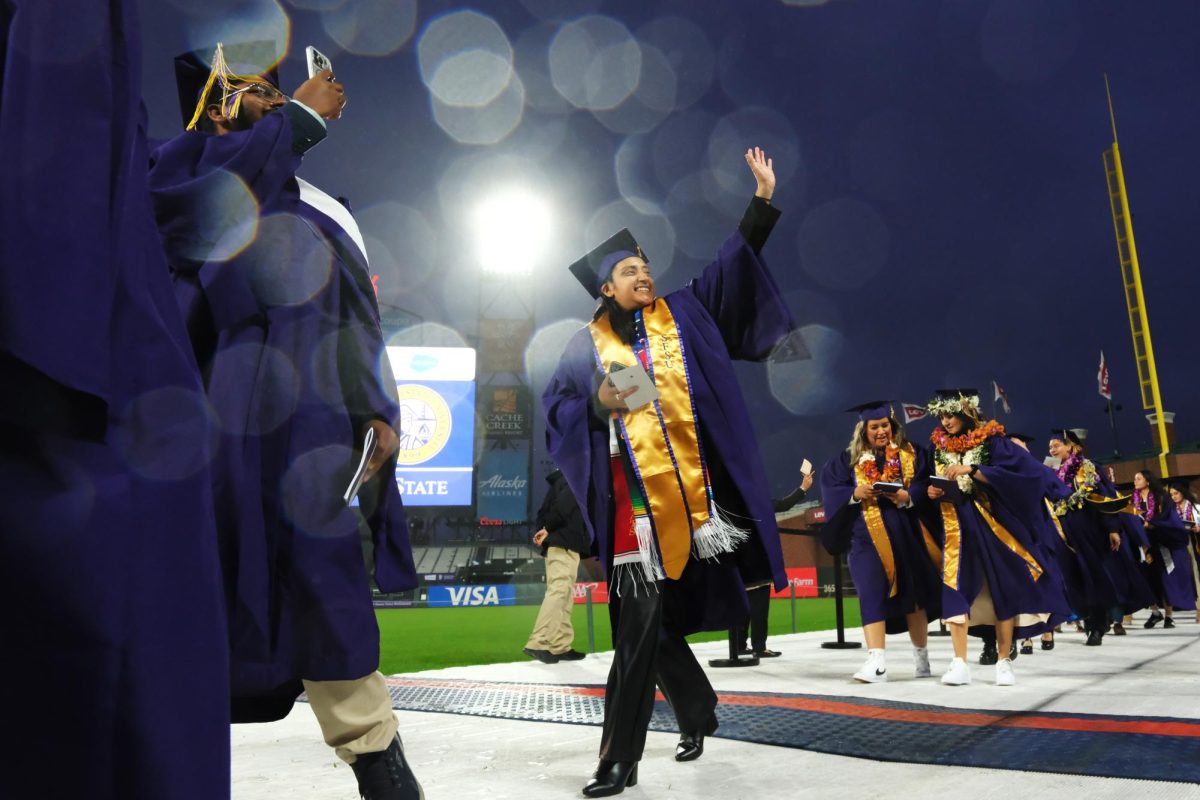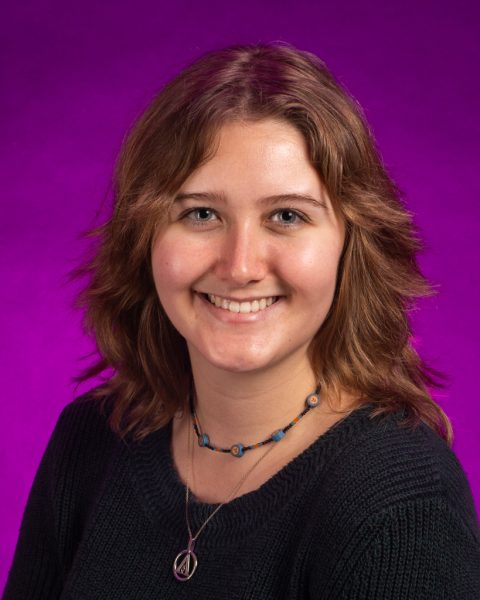Welcome back to Gator Talk, the Xpress podcast that brings city perspectives to local, regional and national news. In today’s podcast episode, staff reporter Sophia Osborn sits down with California State University Employees Union SF State chapter president Sandee Nota and CSUEU Executive Director Jim Philliou to continue the series surrounding labor on campus.
Intro
Sophia: Welcome back to Gator talk. My name is Sophia Osborn and I’m a writer on the staff. I’ll be your host on this episode of Gator talk.
Preview of the Story
Sophia: Today we’ll be continuing our series surrounding labor discussions happening around the San Francisco State University campus. In this episode, we’ll be talking with CSUEU SF State chapter president Sandee Nota and CSUEU executive director Jim Philliou. We discussed the recent tentative agreement between the CSUEU and management and their career and labor. All of this and more coming up next on Gator talk. Let’s get started.
Interview
Sophia: All right, Jim. Sandy, how are you guys today?
Jim: Great, nice to see you.
Sandee: Great.
Sophia: Awesome, awesome. All right, let’s get right into it. Okay, so on October 3, you formed a union with the student assistants. How did that process come about and how’s it going now?
Jim: The part time student assistants that work at all 23 campuses, they petitioned with the Public Employee Relations Board to form a union. And on October 3 PERB validated the signatures to trigger an election, so we’re having an election in January.
Sophia: Gotcha, gotcha. And are you guys having the candidates run for office now? Is there like, petition–not– petitioning, but campaigning that’s happening right now?
Jim: Yes, we’re doing a survey among the student assistants to find out what the issues are. The election will be to set up CSUEU as the bargaining agent, the exclusive bargaining agent for part time student assistants. So once that election is certified, then we’ll negotiate a contract for them alongside our existing members in unit 2579.
Sophia: Gotcha. So they’ll essentially just become a part of the Union then?
Jim: Yes.
Sophia: In that case, how did your bargaining go? Because I know you guys did reach the tentative agreement. So how did that process about– come about?
Sandee: The bargaining team, which is made up of the chair and the vice chair, each of the bargaining units have been bargaining since February, and in October we came to our tentative agreement. It’s great. You know, employees will see a 5% GSI retroactive to July one. Once we ratify our tentative agreement, and they’ll have seen 17% In three years, right? They’ll get 5% this year, 5% next year on July one, and they already got 7% from last year. So for employees, that’s a 17% increase in their salary. But the other issue is that we finally got our steps back, right? After I don’t know, 30 years or so, of not having steps. We’re back to having steps, which is a huge win for our union.
Sophia: Yeah, and what are steps specifically?
Sandee: Jim, do you want to explain?
Jim: Right now, the employees have what’s called an open range pay system, where they give us a high and a low and the manager can move the employee along the range system. A step system is like a scale where the person advances automatically. So in year three of the contract, they’ll be placed on the scale for the first time. And then in future years, they’ll be moving one step at a time.
Sophia: Gotcha. So I’m curious, do you guys work with the CFA here on campus at all? In sort of like the bargaining? I mean, you guys are both unions. So I mean, I’m sure you’ve had discussions about the different things that have been happening on campus. So do they want a step system kind of like you’ve achieved? Do you know?
Jim: They have a different pay system already, so were both affiliated to SCIU. So we work together with them, but their demands are slightly different because we’re trying to reform our pay system and get wage increases. They’re more focused on growing the wages right now and some other issues they’re working on. So again, we work parallel with them.
Sophia: So how has the student engagement been since you guys have reached the tentative agreement? How does the campus feel essentially?
Sandee: I think for our members, like I said, it’s a win for our members. People are very happy with the tentative agreement. I mean I think, you know, there was a talk of us possibly going on strike and for us to reach this agreement with very little takeaway is a win for our members and we’re, you know, telling people to vote yes. And I think that we’ll see a huge Yes vote for this for this TA.
Sophia: Gotcha. And so what would have made you guys go on strike had not reached this tentative agreement?
Jim: I think there was really two things. One was we wanted to grow our wages because we’re below the comparable institutions, community colleges and UC. And then number two, we wanted to transform the system to get back onto a wage scale. So once the CSU offered to put a wage scale in place, then they also offered to fix many of the employees who are misclassified, so they can be properly placed on the scale. So they both grew the wages, and they agreed to change the structure to give people sort of more hope for the future that their wages are going to grow in a fair and predictable way. So if they didn’t do the structural change or they didn’t grow the wages, then we would have had to escalate to another level.
Sophia: We did hear that Sandy, your chapter president is not seeking reelection. So do you know why that is? Why is it sort of right now?
Sandee: Three years ago, I decided to rerun for election. At that time, you know, I didn’t think it was fair for the chapter to have to go through layoffs, right? We had 120 people laid off before that, the pandemic, and then the repopulation to the campus, I didn’t think it was fair to just, you know, throw somebody else in who had no experience. I am just taking a step back for a period of time. I’m still gonna help my chapter out, but there was some personal family issues that I have to deal with. You know, it’s a step back. But it’s also you know, I’m, we need more people to step up and take a leadership role. And I’m just gonna take a step back. And like I said, I tell people I’m still going to be that Bulldog–if managers decide that they’re going to treat my employees badly. I’m still going to be that Bulldog for them.
Sophia: So since this new labor agreement has worked, and it’s going to affect all the members of the employees union, what does that going to look like for you guys on campus these days? I mean, is there going to be like any more just like saying, Oh, we’re here, we want to see more support from us are you guys just like, ready to get back into the workflow—- work?
Jim: Our people always work. So there’ll be membership meetings across every campus in the state from now till November 20. And then on November 20, ballots will go out electronically to all the members and they will vote to either accept or reject the tentative agreement because the members make the final decision. If the members accept the agreement, then we notify the chancellor’s office and the wages get prepared for both the retroactive pay and the new pay system. And then in January, we have an election for the new bargaining unit student, student assistant unit. So that’s kind of a rhythm is to have membership meetings after electronic vote, notify CSU and then January, we shift to focusing on the election for the new group, and then we negotiate a contract for them.
Sophia: What else besides pay is involved in this tentative agreement? I mean pay is a really big one, but like working conditions, time off, maternity leave, things like that.
Sandee: With this agreement, it was really about the salary reopener. It wasn’t about our full contract reopening so, I don’t know that there were any other issues that were part of this agreement. we will go back into contract, I guess our full contract will reopener will be in 2026, because that’s when this contract will end.
Sophia: And all the employees are on a three year contract?
Jim: It was actually a two year contract. Last year, we got to 7%. And like Sandy said and this year, we negotiated 5%. And then they asked us for a two year extension to give them time to prepare the new step system. So it’s a two year contract with a two year extension so it ends up four years of wage increases. But it was a two year contract, and then a two year extension.
Sophia: Gotcha. So after this contract is up, are you guys going to reopen any questions for the management to answer like extending these things that you want in the tentative agreement, and just sort of extending the overall like care of your employees and like the contract length?
Sandee: I think in 2026, or late 2025, we’ll talk to our employees to see what they want changes in our contract, or anything else that they want added to our contract. It’s really up to the bargaining team to bargain those requests or, you know, I guess analyze those requests and determine what’s what’s important to their each bargaining unit .
Jim: We start the process off with a survey of all the members, then the bargaining team analyzes the survey to see what the issues are. And so usually it’s mostly pay, but there’ll be other issues that will come up in 2025, And we’ll take a look at them then, but it’s really pay and we have a fairly good health plan and a fairly good retirement. So the big problem is that we have a lot of turnover because employees are looking for other positions that pay more, so we have about 13% turnover per year. So new employees have to be recruited, trained, develop the knowledge base and people like Sandee who know the campus operations when they leave, It’s a big gap in terms of being able to serve the students. So we’re trying to create a more stable workforce.
Sophia: Yeah, so what do you look for in these new employees that go to hire, I guess within the union as well as just on campus since there is such a high turnover rate, there’s a demand for them right? Well,
Jim: Well we’re looking actually at why they’re leaving, know where they go, because we did surveys that many of them go to community colleges because the pay is better, and the work is very similar. So whatever they’ve learned here, they can easily apply it at City College or College of San Mateo. So we look at why they go in there, and then what are the problems with CSU’s funding that doesn’t permit them to continue to increase wages, or to keep up with the cost of living in the high cost areas like San Francisco, San Diego, San Jose.
Sophia: What was some of the big takeaways that you learned from this process? And like the fact finding, the bargaining,the tentative agreement, just like kind of take me through the process of it all.
Sandee: I think that there’s a little bit of confusion. So we go through bargaining, when you talk about fact finding, that’s when CFA has already declared impasse with the CSU, and they go to a fact finding process, we haven’t had to do that for as long as I can remember, because we’ve always been able to bargain in good faith, and come to an agreement that we can all live with. There were some lean years and when there was the depression, but we’re back on schedule. And for me I think as an employee, this is a great place to work, SF State. And it’s—one thing that people don’t realize is we pay very little for benefits and we’ve been able to keep our benefits at a low cost, whereas other employers may have better wages but the employees end up paying for their health care, and you know, the dental one, and everything else at a higher rate than we did what we pay. As a single person, very little places can pay $0 for their health care.
Jim: The bargaining with the CSU is with the Chancellor’s office, they represent all the campuses. And so we’ve been able to negotiate with them and reach agreements. And this year, we were trying to get agreements for our salary opener, but also get them to acknowledge and permit the student assistant election without any delays, And so they’ve agreed to both things. So our two main objectives were to get the salary opener, grow the wages and transfer it to a step system, and then schedule an election for the part time student assistance so they can begin to bargain their own contract.
Sophia: So what means you guys first want to get involved in the union work that you’re doing?
Sandee: For me, I’ve been chapter president for 10 years, and I’ve been at this campus for 26 years. I remember my union rep when I first started said here, you need to sign this union card. There was a time when the chapter didn’t have any leadership. And so I stepped in to do the leadership role for CSUEU and it’s been really a family for me. I have many friends now from across the state. And I considered it my second family.
Jim: I actually got involved when I was a college student because I was working in the restaurant industry as a waiter. And the hotel restaurant employees union hired me and put me in a training program. And then from that, I developed this as a career and went to law school at Berkeley and then continued working for the Union as a representative and organizing director. And then CSUEU hired me as their executive director 2020 to begin to help them accelerate what they’re doing.
Sophia: It sounds like you guys have been involved in union work for quite a long time. So I’m just curious. What’s one of your favorite memories from working with the union here?
Sandee: Do you remember when there was a big deal about unions and Wisconsin? It’s a few years back now, I remember my biggest memory and the day that I truly became an activist was when we went to the Capitol. Pat Gantt at the time was the CSU statewide president, and he gave an amazing speech at the Capitol. I guess that was my turning point for me to be an activist.
Jim: At CSUEU, we had really our best year this year, where we were negotiating and we had so much support from each of the chapters that whenever we had bargaining, we’d have like 300 people coming in there to have rallies outside the bargaining. And so just seeing that, all across the state, there was a common agenda. And everybody’s working together, so my goal was to get everyone in the union to work together. So we’ve been able to accomplish that this year, and we got some good things done in our contract.
Sophia: Anything else you guys want to say?
Sandee: I just want to thank you for having us here today. You know, it’s always great to be able to talk about CSUEU and feel free to reach out to us if you have any other questions.
Jim: Yeah, we appreciate you having us and as Sandee said any questions, let her know we can follow up with you.
Outro
Sophia: Yeah, for sure. Thanks so much guys. Thank you for listening to Gator Talk. We hope you’ve enjoyed our interview. We’ll be back with more open discussion about the unions that are on campus.
Follow us on social media @GGXnews and keep up with all of our stories GoldenGateXpress.com








